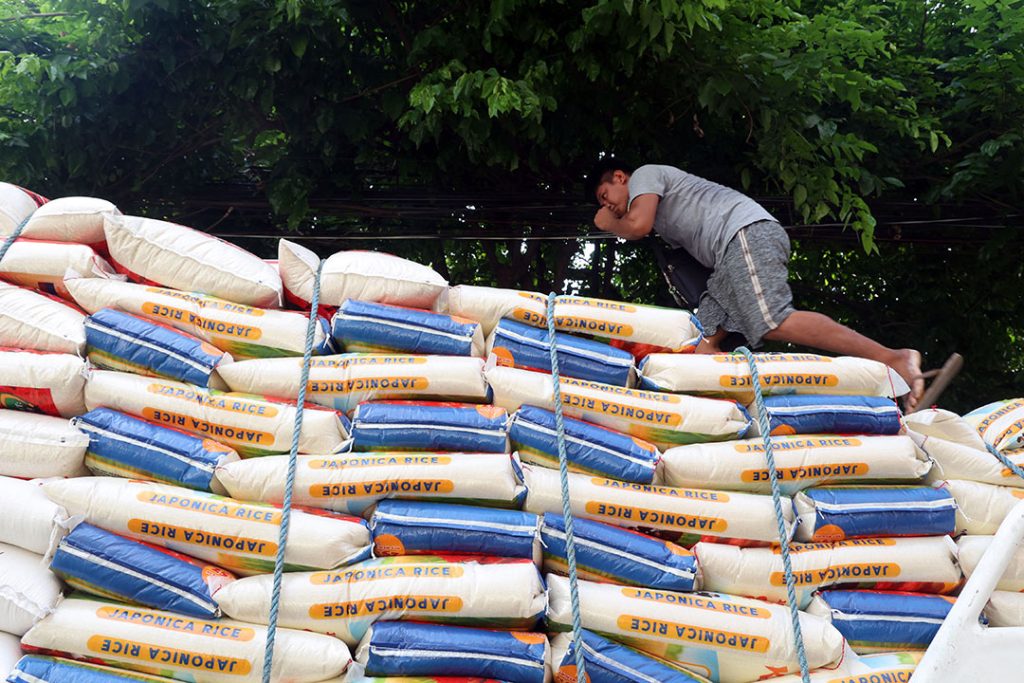Tags
Rice inflation seen to cool once India lifts export ban

By Beatriz Marie D. Cruz, Reporter
RICE INFLATION may further cool in the coming months once India relaxes a ban on exports, analysts said.
“India may reconsider its export ban, impacting international prices further. The stronger peso will also make imports cheaper, easing inflation further,” Union Bank of the Philippines, Inc., Chief Economist Ruben Carlo O. Asuncion said in a Viber message.
Market participants are anticipating that India, the world’s top rice exporter, could soon ease export restrictions on rice.
Last year, global rice prices spiked after India suspended exports of non-basmati white rice.
Headline inflation eased to 3.3% in August from 4.4% in July due to the slower rise in food and transport costs, the Philippine Statistics Authority (PSA) said last week.
In August, rice inflation slowed to 14.7% from 20.9% a month earlier. This was the lowest rice inflation since the 13.2% print in October last year.
Rice was the top contributor to the August inflation basket, accounting for 32.7% or 1.1 percentage points.
National Statistician Claire Dennis S. Mapa has said rice inflation is expected to fall to a single digit in September due to base effect.
It could be recalled that the consumer price index (CPI) for rice first hit double digits in September last year at 17.9%.
However, the effects of the recent Typhoon Enteng as well as higher oil prices may stoke rice inflation, Security Bank Corp. Chief Economist Robert Dan J. Roces said.
“Rice inflation falling to a single digit in September is possible, but it may be difficult to say for sure at the moment with the extent of the recent typhoon damage,” he said in a Viber chat.
Agricultural damage brought by Typhoon Enteng has risen to P659 million, the Department of Agriculture said over the weekend.
“We must remain vigilant of global factors like oil prices and domestic challenges like the impact of typhoons on rice supply, as these could affect future inflation,” Mr. Roces added.
Last week, the Organization of the Petroleum Exporting Countries and their allies including Russia agreed to delay its oil output increase to October and November as crude prices fell to a nine-month low, Reuters reported.
PSA’s Mr. Mapa also noted that the lower tariffs on rice imports have yet to significantly bring down retail prices.
In the last 45 days, the prices of regular and well-milled rice per kilo dropped by an average of 30 and 40 centavos respectively, PSA data showed.
“It’s slow, but we hope to see bigger drops in the coming months,” Mr. Mapa said.
In June, President Ferdinand R. Marcos, Jr. reduced the tariff on rice imports to 15% from 35% until 2028 to tame rice prices.
While the tariff cuts are expected to bring down rice prices, its effects may not be felt by most households, said Ateneo de Manila University economics professor Leonardo A. Lanzona.
“The expected effects of reduced tariffs are concentrated on premium quality rice which the public seldom buys. These types of rice are now relatively cheaper but still more expensive than the locally produced variety consumed by the majority,” he said in a Facebook Messenger chat.
The average price of a kilo of regular milled rice fell to P50.66 in August from P50.90 a month earlier, while well-milled rice prices declined to P55.56 from P55.85, data from the local statistics agency showed.
MORE RATE CUTS
Meanwhile, the Monetary Board is expected to continue with its easing cycle amid the slower inflation in August.
“The recent drop in Philippine inflation, especially rice prices, is a promising sign that our monetary and fiscal policies are working. This should pave the way for more interest rate cuts,” Mr. Roces said.
Mr. Asuncion said they now expect a 25-basis-point (bp) cut in October, and “a probable 1-2% reduction of the RRR (reverse repurchase rate) toward the end of 2024.”
The Bangko Sentral ng Pilipinas (BSP) cut policy rates by 25 bps at its Aug. 15 meeting, bringing the benchmark rate to 6.25% from 6.5% previously.
BSP Governor Eli M. Remolona, Jr. has signaled another 25-bp cut before the year ends. The Monetary Board has two remaining rate-setting meetings this year, on Oct. 17 and Dec. 19.
https://www.bworldonline.com/top-stories/2024/09/09/619667/rice-inflation-seen-to-cool-once-india-lifts-export-ban/Published Date: September 9, 2024







